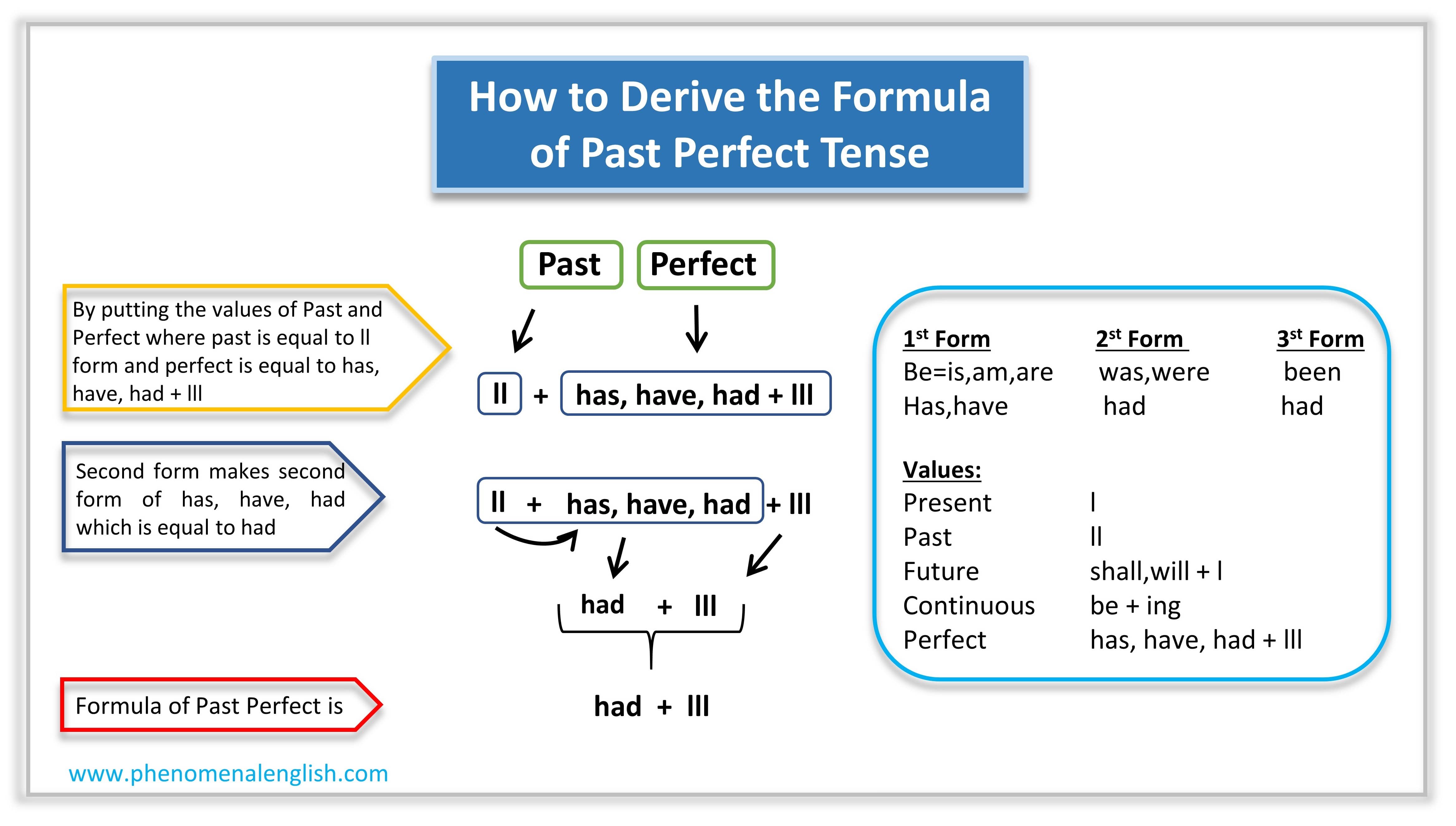Phenomenal English
Solution Destination to your Problems
Past Perfect
Definition of Past Perfect:
Past Perfect tense expresses multiple completed actions in the past. It talks about an action that happened before another action.
Past Perfect allows to convey the sequence or order of the completed actions with combination of Simple Past. Past Perfect indicates earlier action and Simple Past indicates later action. Change in the order of these two tenses does not affect the meaning of whole sentence.
Usages of Past Perfect:
- To express an action in the past occurred before another action in the past.
- Situation: The train left 8am. We reached 8.10am.
Sentence will be: When we reached the station, the train had departed.
The action train had left occurred before occuring the action when we reached. Both actions are in the past.
- Situation: The train left 8am. We reached 8.10am.
- We use Past Perfect to indicate time or an event in the past.
- We had bought that house when my eldest son was seven years old.
- People had protested when President Canady was assassinated. (Event: assissination)
- Probably it was 1990 when we had visited America for the first time. (Time: 1990)
- To describe dissatisfaction or wish in the past.
- I wished I had been wealthy. (wish)
- He wished he had not mudered his brother. (dissatisfaction)
- The boy wished he had known her name.
- Past Perfect is always used with some conjunction or adverb otherwise it must be turned into Simple Past.
- Mark had lost his purse therefore he did not have any ready money. (Conjuction: therefore)
- I had already eaten food. OR I ate food. (without already it will be Simple Past)
- Workers had gone to their houses before factory owner came.
- To express condition of two actions completed in the past.
- If I had been rich, I would have helped him.
- If he had knowledge, he would have written an essay on global warming.
- If I had had this book, I might have gifted her.
- We use Past Perfect in narration (Direct and Indirect).
- He told me that he had had a car.
- Teacher asked if the students had prepared their test.
- Students exclaimed with joy that they had got their degrees.
What is difference between Past Perfect and Simple Past
Simple Past is used when we are to describe sequential or chronological order of event. Past Perfect is used when we are to describe a particuar event at some point in the past and what had happened before or after that event.
Examples
Richard awoke up in the morning, took bath then breakfast and departed for school.These sentences show the order of events in which they occure.
Richard had departed for school before his brother awoke.This sentence shows action of departing is done before the action awoke.
Formation of Past Perfect:


Affirmative Sentences
In positive or affirmative sentences of Past Perfect Tense we use had and past participle (3rd form) of verb. Had is used with 1st person, 2nd person, 3rd person i.e (I, we, they, you, he, she, it, singular names and plural names).
Examples
- She had received bad news therefore she did not feel comfortable.
- Teacher inquired if she had done her hoomework.
- I wished I had seen Taj Mahal.
- We had taken all the injured to the hospital when ambulance arrived.
- I had never enjoyed so much before I joined your company.
Interrogative Sentences
In interrogative sentences of Past Perfect Tense we drag had before subject and use past participle (3rd form) of verb. Had is used with 1st person, 2nd person, 3rd person i.e (I, we, they, you, he, she, it, singular names and plural names).
Examples
- Had he been to eight different doctors before he came to know his problem?
- Had I known about her character before I did not marry her?
- Had he written his book before session started, I would have recommended it?
- Had the doctor operated the patient before the patient died?
- Had he lost his job despite some strong references?
Negative Sentences
In negative sentences of Past Perfect Tense we use not after had and past participle (3rd form) of verb. Had is used with 1st person, 2nd person, 3rd person i.e (I, we, they, you, he, she, it, singular names and plural names).
Examples
- If he had not seen me, he would not have told me about the incident.
- Harris had not gotton math classes before he was tested.
- We had never lived in Birmingham before moving to London.
- Chris had not been in London before so he did not know much about it.
- I had not fallen asleep before 10 o'clock.